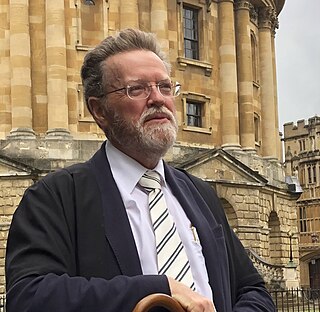Related Research Articles

Universities UK (UUK) is an advocacy organisation for universities in the United Kingdom. It began life in the early 20th century through informal meetings of vice-chancellors of a number of universities and principals of university colleges and was previously known as the Committee of Vice-Chancellors and Principals of the Universities of the United Kingdom (CVCP). As of July 2022, UUK is led by President Steve West – Vice-Chancellor of the University of the West of England – and Chief Executive Vivienne Stern. UUK is registered charity with an annual income of £13.7 million, which is largely raised from its member institutions.

Sir Steven Murray Smith, FAcSS, FRSA is an English international relations theorist and long serving university leader. He is the former Vice Chancellor of the University of Exeter and Professor of International Studies.
Nelson Mandela University and before that - the University of Port Elizabeth (UPE), the Port Elizabeth Technikon and Vista University's Port Elizabeth campus. This South African university has its main administration in the coastal city of Gqeberha. Nelson Mandela University was founded through a merger of three institutions in January 2005, but its history dates back to 1882, with the foundation of the Port Elizabeth Art School.

Sir Peter John Gregson, FREng is a British research engineer and Chair of the Henry Royce Institute. He was previously the Vice-Chancellor of Cranfield University from 2013-2021 and President and Vice-Chancellor of Queen's University Belfast from 2004. Prior to that he was deputy Vice-Chancellor at the University of Southampton from 2000-2004.

Sir Paul James Curran was president of City, University of London between August 2010 and June 2021. Sir Paul is now professor emeritus. Following a period of significant progress, City joined the University of London Federation in September 2016. He served previously as vice-chancellor of Bournemouth University (2005–10) and deputy vice-chancellor at the University of Southampton, where he is currently a visiting professor. As a member of the senior management team at Southampton, progressing from head of geography to dean of science, Curran was credited with high-profile leadership as head of the Winchester School of Art, part of the University of Southampton.
The ancient university governance structure in Scotland is the organisational system imposed by a series of Acts of Parliament called the Universities (Scotland) Acts 1858 to 1966. The Acts applied to what were termed the 'older universities': the University of St Andrews, the University of Glasgow, the University of Aberdeen and the University of Edinburgh. Together these four universities are commonly referred to as the ancient universities of Scotland. Whilst the Acts do not directly apply to the University of Dundee, the same governance structure was ordained for use by that institution in its royal charter.

Sir Keith Burnett, CBE, FRS FLSW is a British physicist and President Elect of the Institute of Physics. He is Chair of the Nuffield Foundation — an independent charitable trust with a mission to advance educational opportunity and social well-being, founding Chair of the Academic Council the Schmidt Science Fellows, and a member of the Board of international education providers Study Group.

Sir Steven George West is a British podiatrist, the vice-chancellor, president and chief executive officer of the University of the West of England since 2008. He holds a number of national and international advisory appointments in higher education, healthcare policy and regional government.
Sir Charles Duncan Rice was a Scottish academic who was Principal of the University of Aberdeen from September 1996 to 1 April 2010. He previously served at New York University in the United States, as Dean of the Faculty of Arts and Science (1985–91) and Vice-Chancellor (1991–96).

Andrea Nolan is Professor of Veterinary Pharmacology and Principal & Vice Chancellor of Edinburgh Napier University. In 1999, she was the first woman ever appointed to head a British veterinary school.

Sir Ian David Diamond is a British statistician, academic, and administrator, who served as Principal and Vice-Chancellor of the University of Aberdeen until 2018. He became the UK's National Statistician in October 2019.
Nigel Peter Weatherill FIMA, C.Math, FRAeS, C.Eng, C.Sci, FREng, DL is the former Vice-Chancellor and Chief Executive of Liverpool John Moores University. Prior to this he had been Pro-Vice-Chancellor for Research and Head of the School of Engineering at the University of Swansea, then later Pro-Vice-Chancellor and Head of the College of Engineering and Physical Science at the University of Birmingham.

Sir Francis Gerard McCormac, FRSE, FSA, FRSA, FHEA is the Principal and Vice-Chancellor of the University of Stirling. He is a physicist whose specialist fields are Space physics and Carbon Dating. He is a member of the advisory board of the International College for Liberal Arts at Yamanashi Gakuin University in Japan. Previous roles include Professor and Pro Vice-Chancellor at Queen's University Belfast and Vice-Chairman of Invest Northern Ireland. He chaired a review of teacher employment for the Scottish Government in 2011.
Jenny Higham is the first woman to serve as Principal of St George's, University of London, which she took up an appointment in November 2015. St George's, University of London obtained University status in June 2022, meaning Professor Higham's position is now Vice-Chancellor. She was the first female to be elected chair of the Medical Schools Council. Higham is also an honorary consultant at St. Georges NHS Foundation Trust and a visiting professor at the Imperial College London.
Colin G. Bailey is a researcher in structural engineering, who became the President and Principal of Queen Mary University of London in September 2017. Prior to that, Bailey was Deputy President and Deputy Vice-Chancellor at the University of Manchester. He is a Fellow of the Royal Academy of Engineering, the Institution of Civil Engineers, the Institution of Structural Engineers and a member of the Institution of Fire Engineers.

George Boyne has been Principal and Vice-Chancellor of the University of Aberdeen since 1 August 2018. He was previously Pro-Vice Chancellor and Dean of the Business School at Cardiff University in Wales.
The Principal of the University of Aberdeen is the working administrative head of the university, acting as its Chief Executive. He is responsible for the overall running of the university, presiding over the main academic body of the university, the Senatus Academicus. The Principal is normally also created Vice-Chancellor of the university, enabling him to perform the functions reserved to the Chancellor in the latter's absence, such as the awarding of degrees.
References
- ↑ UCEA Website
- ↑ "UCEA appoints new Chief Executive designate". Universities & Colleges Employers Association. Retrieved 10 October 2019.
- ↑ "UCEA announces Professor George Boyne as new Chair". Universities & Colleges Employers Association. Retrieved 12 October 2022.